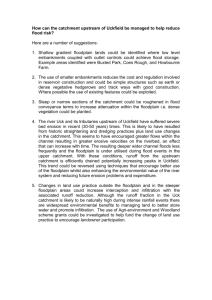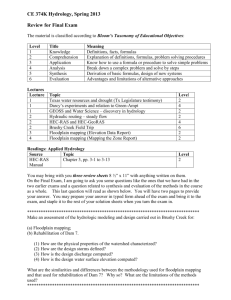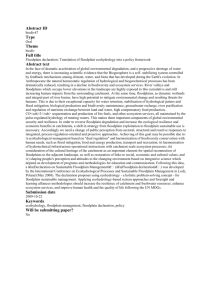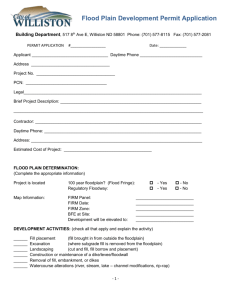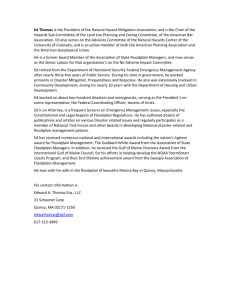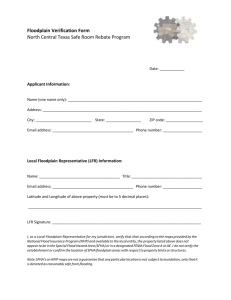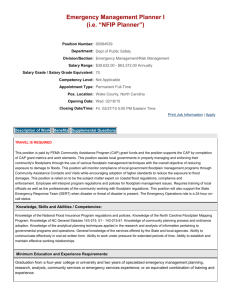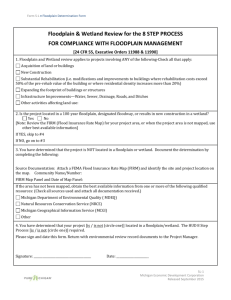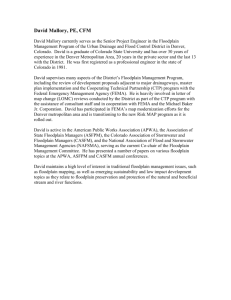2 purpose of the workshop
advertisement
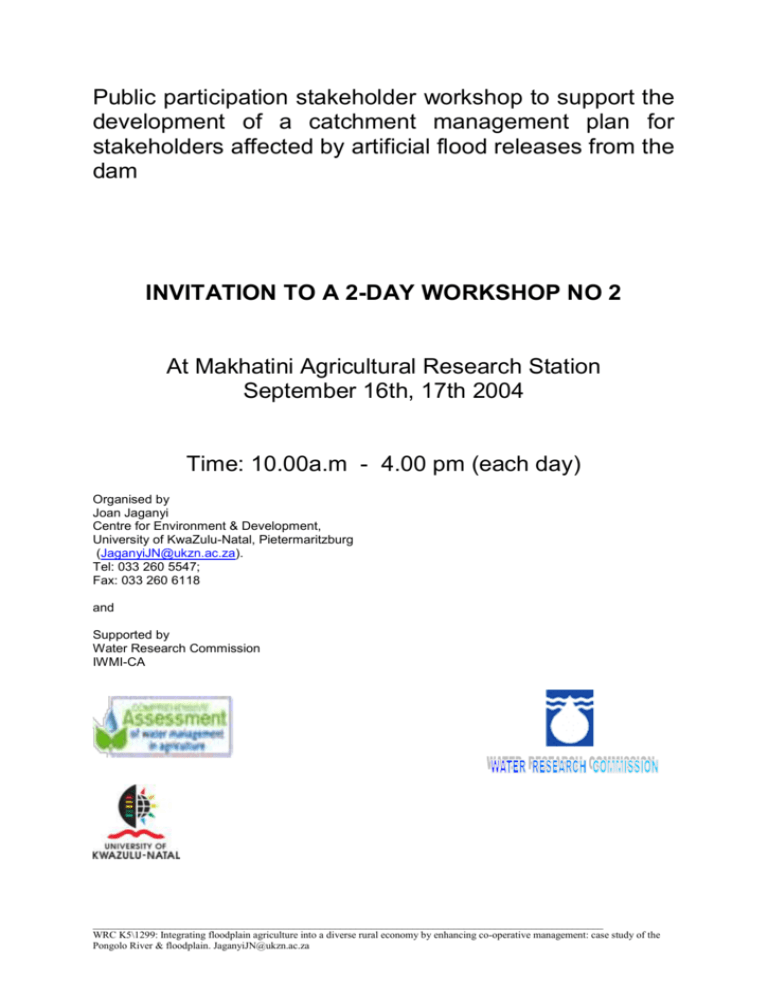
Public participation stakeholder workshop to support the development of a catchment management plan for stakeholders affected by artificial flood releases from the dam INVITATION TO A 2-DAY WORKSHOP NO 2 At Makhatini Agricultural Research Station September 16th, 17th 2004 Time: 10.00a.m - 4.00 pm (each day) Organised by Joan Jaganyi Centre for Environment & Development, University of KwaZulu-Natal, Pietermaritzburg (JaganyiJN@ukzn.ac.za). Tel: 033 260 5547; Fax: 033 260 6118 and Supported by Water Research Commission IWMI-CA ___________________________________________________________________________________________________ WRC K5\1299: Integrating floodplain agriculture into a diverse rural economy by enhancing co-operative management: case study of the Pongolo River & floodplain. JaganyiJN@ukzn.ac.za 2 TERMS OF REFERENCE: This workshop is part of the requirements of a Water Research Commission funded Project K5\1299: Integrating floodplain agriculture into a diverse rural economy by enhancing co-operative management: case study of the Pongolo River & floodplain. 1 PURPOSE (i) Continue to build on the outcomes of the first public participation workshop held in October 2002 (See Appendix 1). (ii) Present a report back to stakeholders-showing outcomes of the social survey research that support the need for stakeholder decision to develop a catchment management plan. (iii) Assist stakeholders affected by artificial flood releases from the dam to build a catchment management plan based on the processes and principles outlined in the National Water Act, 1998. 2 OUTPUT A proposed catchment management implementation plan which can be submitted to DWAF (and other relevant funding organisatiions e.g. WRC) for approval and support. 3 AGENDA Understanding the water protection policy (Joan Jaganyi) i. The role of CMAs & WUAs ii. The water protection policy iii. Policy theory & decision making 4 Report on downstream social survey results (Joan Jaganyi and Mvuse Mgeyane) i. Description of the area ii. Hydrology perceptions (flood volume, timing) iii. Perceptions of impacts of artificial floods on the floodplain resources iv. Perceptions of impacts of artificial floods on disease v. Perceptions of impacts on fish (Nkosinathi Matiwane??) vi. Power relationships and social organization (Mvuse Mgeyane) 5 Report on Upstream dam property activities i. WUA constitution Pongolapoort dam -Sustainable utilization plan (SUP)-(Paul Bewsher & Lauren Fick) ii. Fish aquaculture studies on the dam & at Makhatini research station (Q. Rouhani & Stephen Goetzes) 6 Report on new initiatives in the catchment i. LWWP-(Charel Bruwer, Clive Poultney & Zeph Nyati) ii. DWAF-(Beason Mwaka & Collin Zwane) iii. DoA-(Justice Mchunu & Caspar Nkabinde) iv. DEA-(Muzi Mtshali) ___________________________________________________________________________________________________ WRC K5\1299: Integrating floodplain agriculture into a diverse rural economy by enhancing co-operative management: case study of the Pongolo River & floodplain. JaganyiJN@ukzn.ac.za 2 3 v. vi. DoH-(JK Gumede) E-KZN wildlife-(Catherine Hanekom and Peter Conant) 7 Presentation of a proposed catchment management implementation plan (Joan Jaganyi) 8 Lectures on best practice for catchment management implementation plans (Mark Dent) We know where we are (Current state) We know where we want to be (Desired State-Vision) How best can we get there quickly (Implementation plan coupled with best practice) Mark Dent will shortly point out key approaches with respect to: i. Clear visions ii. Good leaders iii. Coordinators iv. Compatible needs v. Implement plan vi. Partnerships vii. Good tools viii. Measure progress ix. Involvement x. Small successes 9 Facilitated stakeholder discussions of a way forward (Dominic Mitchell) i. Achieve consensus on a vision ii. Achieve consensus on a catchment management plan Please note: detailed time slots for talks (will come later???) ___________________________________________________________________________________________________ WRC K5\1299: Integrating floodplain agriculture into a diverse rural economy by enhancing co-operative management: case study of the Pongolo River & floodplain. JaganyiJN@ukzn.ac.za 3 4 APPENDIX 1: AGENDA OF THE FIRST PUBLIC PARTICIPATION STAKEHOLDER WORKSHOP HELD AT MAKHATINI RESEARCH STATION, OCTOBER 16TH & 17TH, 2002 Please note that a full report of this workshop is in a report entitled: Jaganyi J, Salagae M, Matiwane N, Mgeyane M, Kotze D, McCartney M and Molden D (Editors) (2003) Dialogue approach to building stakeholder shared understanding of the driving forces of the current state of the Pongolo river and floodplain. Stakeholder public participation workshop. Makhatini Research Station. October 2002. Water Research Commission Project K5\1299. Progress Report No. 3. AGENDA 1. INTRODUCTION The Pongolo floodplain provides us with an opportunity to develop a research programme with the challenge of achieving water security for the sustainable production of food and the support of rural livelihoods while preserving natural resources and ecosystems. How can decision-support of people’s water based activities (e.g. irrigation farming, fishing, tourism and conservation and subsistence use) be improved at various scales-household, farm, irrigation scheme or river catchment? Can the gap between agricultural and environmental sectors be bridged so as to enhance implementation of agreed upon, workable solutions to this challenge? We believe that the solution lies in understanding and implementing co-management approaches, structures and processes-which is at the heart of Integrated Catchment Management (ICM). 2 PURPOSE OF THE WORKSHOP Before transformation or change process(es) can be defined clearly, it is critical to understand the context in order to know how change can best be stimulated and sustained. Purpose of the workshop is to bring all stakeholders together so that both stakeholders and project team researchers can build a shared understanding of each others perception of the environmental issues relating to the Pongolo river floodplain system. 2.1 Problem statement(s) based on stakeholders’ perceptions. Stakeholders will prepare and present a 10-minute presentation of their perceptions of the environmental issues contributing to the current state of the floodplain. The outcome of this process will be a re-defined problem statement based on stakeholders’ perceptions. Experience has shown that before groups can develop visions and goals, there must be a clear and widely recognised problem statement. This statement helps to establish a common understanding of the conditions that warrant a catchment, sub-catchment protection effort. 2.2 Vision(s) Based on the problem statement(s) from above, develop best plans comprising clear visions. Visions can rally individuals to take action and to focus their efforts on specific goals. Best visions are graphic in their descriptions and relate to human experience. In the USA, Bernie Fowler, a former Maryland state senator and a leading voice on environmental issues, brought instant attention to the problem of sediment in a certain important river when he stood chest high in the river and declared: “I want to be able to see my feet.” Visions must also be scientifically accurate, represent the facts and be understandable to the general public. Clear visions can help groups to understand, relate to, and support protection and restoration efforts. When framed well, visions can also help the general public, elected officials, business, the press, and community leaders understand. ___________________________________________________________________________________________________ WRC K5\1299: Integrating floodplain agriculture into a diverse rural economy by enhancing co-operative management: case study of the Pongolo River & floodplain. JaganyiJN@ukzn.ac.za 4 5 2.3 Goals, objectives, action items In addition to visions, groups usually develop goals, objectives, and action items. The difference among them is explained below: Visions-general statements of where the effort wants to go and what it will accomplish over a given time span (usually 5 to 10+ years). Visions should be comprehensive enough to capture the thrust of the efforts overall mission; Goals-less general than visions, describe what is needed to obtain vision, refer to components of overall effort, sometimes quantifiable; Objectives-elaboration of goals, describe types of management or activities and are quantifiable where possible; Action items-explain who is going to do what, where, and when; they generally articulate hoe to implement the objectives and should be quantified if possible; benchmarks of existing conditions and \or indicators should be developed for action items. These four elements are then folded into an IMPLEMENTATION PLAN. It is desirable to obtain commitment to as many of them as possible. 2.4 Facilitation A facilitated workshop process is necessary for stakeholders to develop their statements. A facilitator as a “neutral party”, can help people reach consensus and avoid getting bogged down in arguing among interests. What is important is to get issues on the table. Designating them can come later. 3 OUTPUTS Workshop report comprising an initial broad project implementation plan for action 4 OUTCOMES Common or shared vision(s); Focus on issues requiring protection efforts; Ownership of the process; Improved communication; Get more people involved: a primer for promoting co-operative governance over resource use which is at the heart of Integrated Catchment Management (ICM); Enhance networking and diffusion of knowledge and understanding relating to the diverse use of the floodplain resources among stakeholders; Enhance stakeholder enthusiasm and build commitment for the need to develop a shared vision of a preferred state of the floodplain. ___________________________________________________________________________________________________ WRC K5\1299: Integrating floodplain agriculture into a diverse rural economy by enhancing co-operative management: case study of the Pongolo River & floodplain. JaganyiJN@ukzn.ac.za 5
